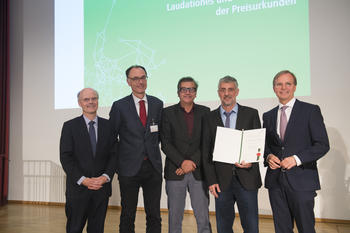A Global Understanding of Political Modernity
Brazilian sociologist José Maurício Domingues recipient of Anneliese Maier Research Award / He will be a guest at the Institute for Latin American Studies at Freie Universität in January and February 2019.
Dec 11, 2018
Left to right: E. Aufderheide, Secretary General of the AvH Foundation, W. Knöbl, Institute for Social Research, S. Costa, Institute for Latin American Studies, award winner J. M. Domingues, Thomas Rachel, Parliamentary State Secretary at the BMBF
Image Credit: Humboldt-Stiftung/ Jens Jeske
José Maurício Domingues firmly believes that taking a global view is the only way to understand the present day. Domingues, a sociologist from Rio de Janeiro State University, is excellently equipped to do just that: He can read six languages – aside from his native language, Portuguese, he also reads English, Spanish, French, German, and Italian – and has spent time in India, China, and Israel for research purposes.
In his research, Domingues is especially interested in how political modernity arises. What he means by that is mainly the way politics works in the 21st century. Political modernity began in 19th-century Europe and spread to the rest of the world from there.
Award Intended to Internationalize the Humanities
For “building bridges between continents,” the Alexander von Humboldt (AvH) Foundation granted the scholar the Anneliese Maier Research Award on September 12, 2018, following his nomination by sociology professor Sergio Costa of the Institute for Latin American Studies at Freie Universität and Professor Wolfgang Knöbl of the Hamburg Institute for Social Research. The award comes with 250,000 euros in prize money and is intended for cooperative research in Germany.
The prize money finances cooperation with colleagues within the field in Germany for a period of up to five years. The AvH Foundation intends the award to help promote the internationalization of the humanities and social sciences in Germany; it is funded by the German Federal Ministry of Education and Research (BMBF).
A Contemporary Theoretician of Global Modernity
The nominators’ statement on his work reads as follows: “Professor Domingues’s work is characterized by a consistent orientation toward theory, and he is one of the few social scientists who succeed in linking theoretical debates carried out in Latin America with those being conducted in other parts of the world in English, French, and German. That makes him one of the most important contemporary theoreticians who examine global modernity from a comparative perspective on civilization.”
Domingues does research and teaches in various countries, expanding on his foreign language skills all the while. He studied in the UK and has completed several research stints in Germany. Alongside time spent doing research in Asia and Israel, Domingues teaches in South America; last year, he also worked at New York University for six months.
Domingues’s work is distinguished by an interdisciplinary approach: He incorporates historical studies and philosophical considerations into his work – an unusual tack among sociologists, and one that is explained by his studies: Domingues studied history at the Pontifical Catholic University of Rio de Janeiro, independently familiarizing himself with modern philosophy in the process. Those who only work on theoretical sociology, Domingues says, run the risk of boxing themselves into theory alone. “My knowledge of history and philosophy helps me view theories with a critical eye,” he says.
Domingues’s dissertation offers one example. In it, he considered the view that social life arises from conflict or tension between the individual and the collective. This assumption was widespread among adherents of the general theory of sociology that arose in Western Europe and North America after 1945. Domingues compared this view regarding collective entities and subjects with statements made by philosophers Jürgen Habermas and Karl Marx.
He concluded that collectives – religions, for example, or political parties – also influence each other heavily. He coined the term “collective subjectivities” to describe this phenomenon. Later, Domingues turned to the study of “social creativity,” investigating how creativity arises through social exchange and dialogue.
These concepts are incorporated into Domingues’s latest book, which will be released in the spring of 2019. It is a summary of his previous research, dealing with political modernity, but it is also intended as an alternative to existing sociological concepts. To analyze current social and political conditions, Domingues turned again to the ideas of two German philosophers, this time Georg Wilhelm Friedrich Hegel and – once again – Karl Marx. He says they were the first to divide reality into systematic categories and put forward a process analysis on that basis.
Research Stay in Germany in 2019
With an eye to the present, Domingues, like many others, sees a clear antidemocratic trend in Europe and the United States. But he is interested in more than just criticizing U.S. President Donald Trump: Instead, Domingues’s primary criticism is of the way the democratic system is sliding into oligarchical rule, where only a few people – the rich – have power, as is the case in the U.S. He also believes the term “populism” is a misnomer. Instead, Domingues distinguishes between left, right, and liberal.
In his view, a great deal could be done to support democratic structures: Parties and media need to be democratized, civil society bolstered, and representative democracy expanded to include aspects of direct democracy, and, as he puts it, the “power of capital should be neutralized.” Domingues is scheduled to come to the Hamburg Institute for Social Research and the Institute for Latin American Studies at Freie Universität Berlin in January and February 2019 to do research. During his time there, he will study topics including how left-wing political forces in Germany are responding to the current popularity of right-wing movements.
This text was originally published in German in campus.leben on September 13, 2012.

